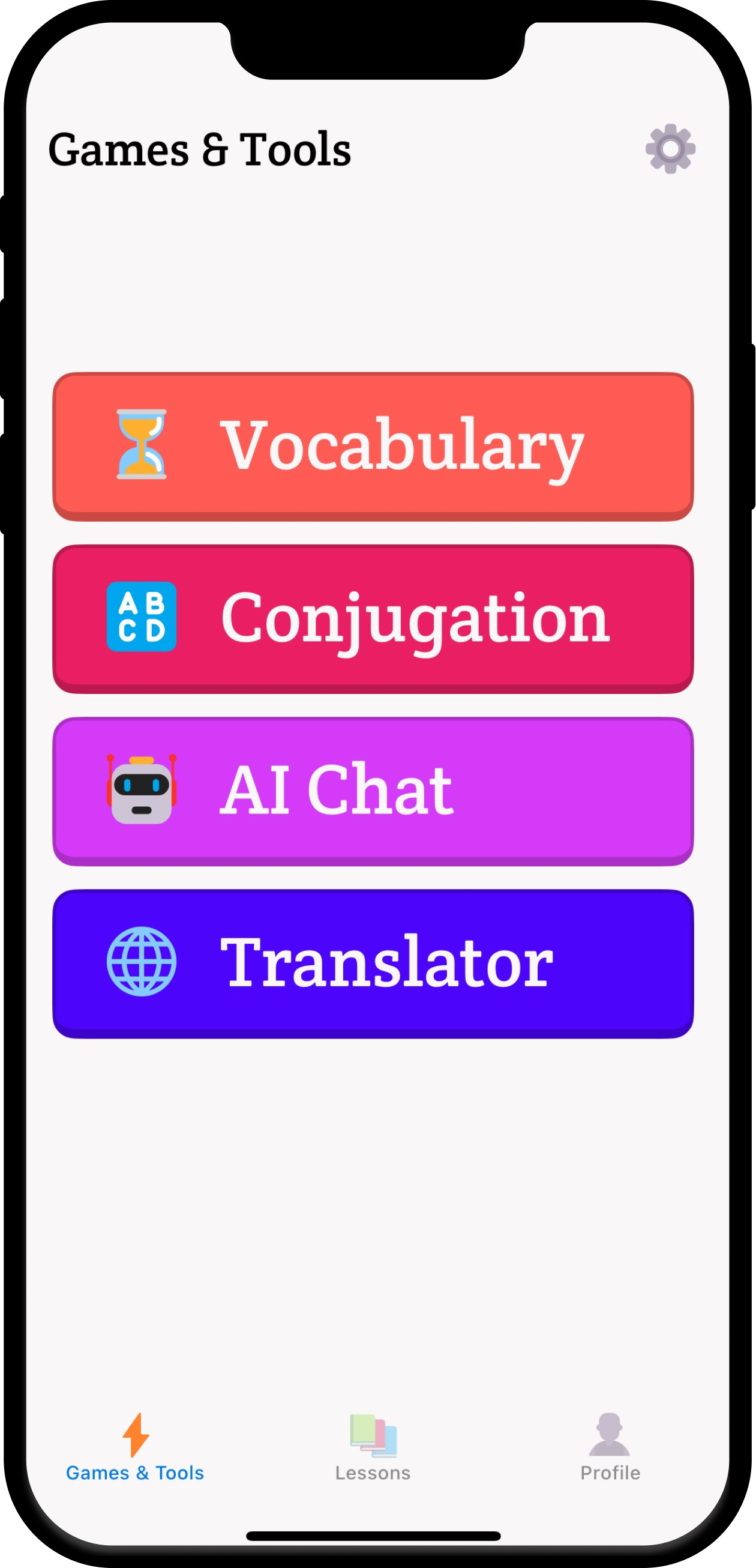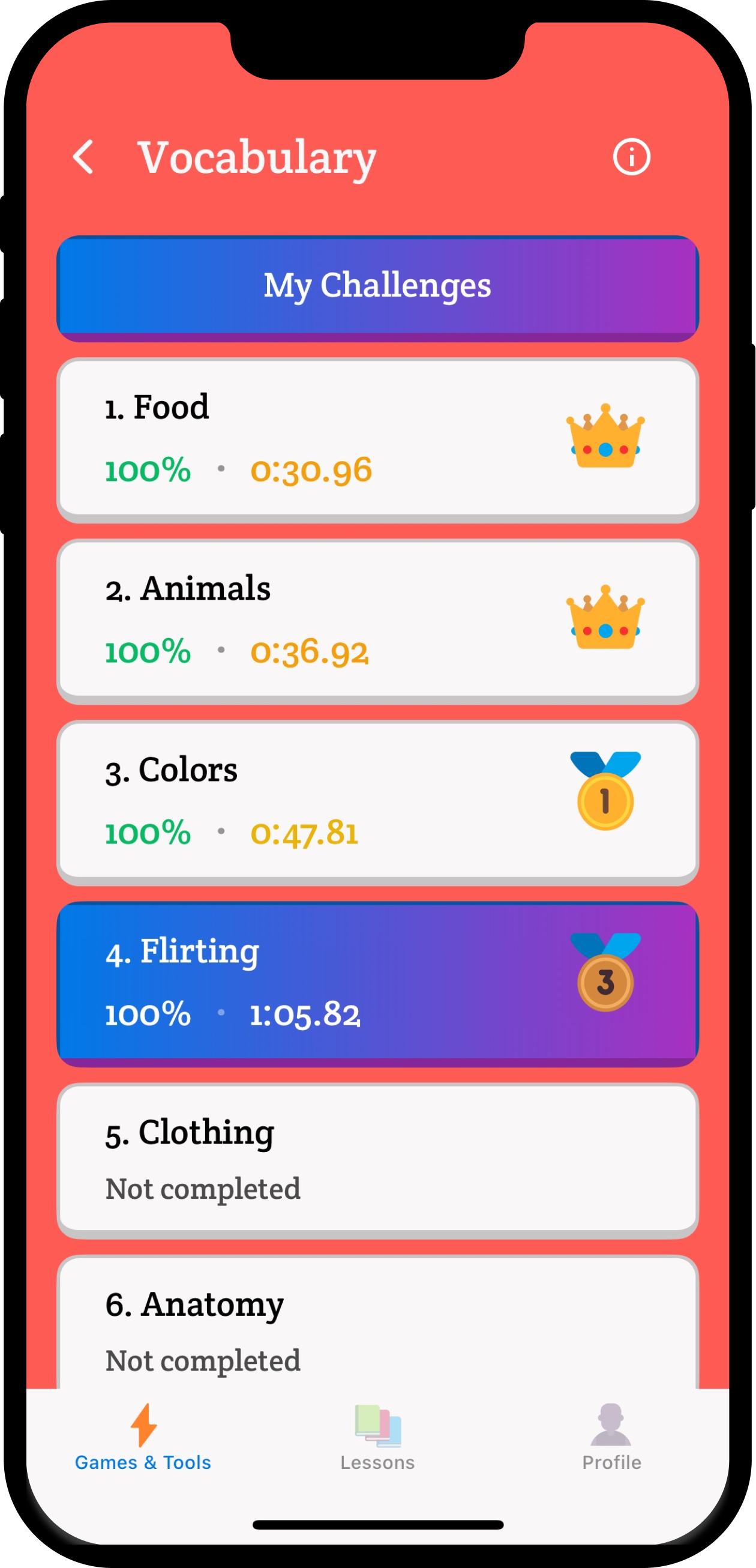The Language Learner's Guide to Portuguese False Friends

The Language Learner's Guide to Portuguese False Friends
One of the trickiest parts of learning a new language, especially one that's closely related to a language you already know, is navigating "false friends." These are words that look or sound similar in both languages but have completely different meanings. For learners jumping between Spanish and Portuguese, this is a very common hurdle.
Ready to Learn More?
Try PolyChat's interactive language learning games and put your new vocabulary to the test!

Games & Tools
Essential tools for every learner

Timed Challenges
Practice vocabulary & conjugation

Interactive Games
Learn through engaging gameplay
This guide will help you spot some of the most common false friends between European Portuguese and Spanish to save you from awkward misunderstandings.
Common Portuguese-Spanish False Friends
-
Apelido
- In Portuguese: Nickname.
- O meu apelido é "Jota". (My nickname is "Jota".)
- In Spanish: Surname / Last name.
- Mi apellido es García. (My surname is García.)
- Note: The Portuguese word for surname is sobrenome.
- In Portuguese: Nickname.
-
Borracha
- In Portuguese: Eraser.
- Preciso de uma borracha para apagar isto. (I need an eraser to erase this.)
- In Spanish: Drunk (feminine).
- La chica está borracha. (The girl is drunk.)
- Note: The Portuguese for drunk is bêbada.
- In Portuguese: Eraser.
-
Brincar
- In Portuguese: To play / to joke.
- As crianças gostam de brincar no parque. (The children like to play in the park.)
- In Spanish: To jump.
- Tienes que brincar para alcanzarlo. (You have to jump to reach it.)
- Note: To play in Spanish is jugar.
- In Portuguese: To play / to joke.
-
Cena
- In Portuguese: Scene (in a movie, play, etc.).
- A última cena do filme foi surpreendente. (The last scene of the movie was surprising.)
- In Spanish: Dinner.
- La cena está lista a las ocho. (Dinner is ready at eight.)
- Note: Dinner in Portuguese is jantar.
- In Portuguese: Scene (in a movie, play, etc.).
-
Embaraçada
- In Portuguese: Embarrassed / Awkward.
- Fiquei tão embaraçada quando caí. (I was so embarrassed when I fell.)
- In Spanish: Pregnant.
- Mi hermana está embarazada. (My sister is pregnant.)
- Note: The Portuguese for pregnant is grávida. This is a classic and very important one to get right!
- In Portuguese: Embarrassed / Awkward.
-
Escova
- In Portuguese: Brush (for hair, teeth, etc.).
- Uso uma escova macia para os dentes. (I use a soft brush for my teeth.)
- In Spanish: Broom.
- Usa la escoba para barrer el suelo. (Use the broom to sweep the floor.)
- Note: A broom in Portuguese is a vassoura.
- In Portuguese: Brush (for hair, teeth, etc.).
-
Esquisito/a
- In Portuguese: Weird / Strange.
- Ele tem um sentido de humor muito esquisito. (He has a very weird sense of humor.)
- In Spanish: Exquisite / Delicious.
- Esta paella está exquisita. (This paella is exquisite.)
- Note: The Portuguese for exquisite is requintado or delicioso.
- In Portuguese: Weird / Strange.
-
Largo/a
- In Portuguese: Wide.
- Esta rua é muito larga. (This street is very wide.)
- In Spanish: Long.
- Tiene el pelo muy largo. (She has very long hair.)
- Note: Long in Portuguese is comprido or longo.
- In Portuguese: Wide.
-
Oficina
- In Portuguese: Workshop / Garage (for repairs).
- O meu carro está na oficina. (My car is at the workshop/garage.)
- In Spanish: Office.
- Trabajo en una oficina en el centro. (I work in an office downtown.)
- Note: An office in Portuguese is an escritório.
- In Portuguese: Workshop / Garage (for repairs).
-
Polvo
- In Portuguese: Octopus.
- Adoro comer polvo à lagareiro. (I love eating octopus with olive oil and garlic.)
- In Spanish: Dust / Powder.
- Hay mucho polvo en los muebles. (There is a lot of dust on the furniture.)
- Note: Octopus in Spanish is pulpo.
- In Portuguese: Octopus.
-
Pronto/a
- In Portuguese: Ready.
- O jantar está pronto! (Dinner is ready!)
- In Spanish: Soon.
- Nos vemos pronto. (See you soon.)
- Note: Ready in Spanish is listo/a.
- In Portuguese: Ready.
-
Salsa
- In Portuguese: Parsley.
- Pique a salsa para a salada. (Chop the parsley for the salad.)
- In Spanish: Sauce.
- ¿Quieres más salsa para tus tacos? (Do you want more sauce for your tacos?)
- Note: Sauce in Portuguese is molho.
- In Portuguese: Parsley.
-
Tirar
- In Portuguese: To take off / remove / take (a photo).
- Vou tirar os sapatos. (I'm going to take off my shoes.)
- In Spanish: To throw away / to pull.
- No tires la comida. (Don't throw away the food.)
- Note: To throw away in Portuguese is deitar fora or jogar fora.
- In Portuguese: To take off / remove / take (a photo).
-
Vaso
- In Portuguese: Plant pot / Vase.
- Comprei um vaso novo para esta planta. (I bought a new pot for this plant.)
- In Spanish: Drinking glass.
- ¿Me das un vaso de agua? (Can you give me a glass of water?)
- Note: A drinking glass in Portuguese is a copo.
- In Portuguese: Plant pot / Vase.
More Subtle & Tricky False Friends
The list above covers some of the most common mistakes, but here are a few more subtle ones that can lead to confusion in conversation.
-
Aceitar
- In Portuguese: To accept.
- Ele decidiu aceitar a oferta de emprego. (He decided to accept the job offer.)
- In Spanish: This word is very similar to aceitar, which means to oil or lubricate something. The Spanish word for "to accept" is aceptar.
- Note: A small but important spelling difference.
- In Portuguese: To accept.
-
Copo
- In Portuguese: Drinking glass.
- Podes me dar um copo de água? (Can you give me a glass of water?)
- In Spanish: Flake (like in copo de nieve - snowflake).
- Note: As mentioned before, a glass in Spanish is a vaso.
- In Portuguese: Drinking glass.
-
Dirección
- In Portuguese: This looks like direção, which means direction or management.
- In Spanish: Address.
- ¿Cuál es tu dirección? (What is your address?)
- Note: The word for address in Portuguese is morada or endereço (the latter is more common in Brazil).
-
Duende
- In Portuguese: This word is not common, but can mean goblin or elf, much like in Spanish. However, the meaning is much more restricted than the Spanish usage.
- In Spanish: Charm, magic, special charisma (especially in the context of flamenco).
- Esa bailaora tiene mucho duende. (That flamenco dancer has a lot of charm/magic.)
- Note: A deeply cultural and often untranslatable concept in Spanish.
-
Exquisito
- In Portuguese: This means the same as in Spanish (exquisite, delicious), but it is much less common.
- In Spanish: Exquisite / Delicious (very common).
- El vino era exquisito. (The wine was exquisite.)
- Note: In Portuguese, it is more common to use delicioso, saboroso, or requintado.
-
Pastel
- In Portuguese: A savory, deep-fried pastry, often with various fillings. A very popular snack in Brazil.
- Quero um pastel de queijo. (I want a cheese pastel.)
- In Spanish: Cake or pastry (sweet).
- Vamos a comer pastel en la fiesta. (We are going to eat cake at the party.)
- Note: Cake in Portuguese is bolo.
- In Portuguese: A savory, deep-fried pastry, often with various fillings. A very popular snack in Brazil.
-
Propina
- In Portuguese: A bribe. Be very careful with this one!
- O político foi acusado de aceitar propina. (The politician was accused of accepting a bribe.)
- In Spanish: A tip (for a waiter, etc.).
- Dejamos una buena propina para el camarero. (We left a good tip for the waiter.)
- Note: A tip in Portuguese is a gorjeta. This mix-up can be very serious.
- In Portuguese: A bribe. Be very careful with this one!
-
Salada
- In Portuguese: Salad.
- Uma salada fresca para o almoço. (A fresh salad for lunch.)
- In Spanish: Salty (feminine).
- La sopa está demasiado salada. (The soup is too salty.)
- Note: Salad in Spanish is ensalada.
- In Portuguese: Salad.
Don't be discouraged by this list! Every language learner makes these kinds of mistakes. The key is to be aware of them. When you learn a new word in Portuguese that looks like one you know in Spanish, take a second to confirm its meaning. Happy learning!
Related Posts
How Gamification Makes Learning a New Language Faster and More Fun
Learn how gamification can make all the difference in your language journey, and why it's the core philosophy behind Polychat.
Read more100 Palabras y Expresiones de Jerga Inglesa
Una guía completa de la jerga inglesa, incluyendo falsos amigos, modismos y expresiones que suelen causar confusión.
Read morePolyChat: A Melhor Aplicação para Aprender Idiomas para Portugueses em 2025
Descubra porque é que o PolyChat é a aplicação ideal para portugueses que querem aprender inglês, francês, alemão, espanhol e outros idiomas. Comparação com Duolingo, Babbel e outras aplicações.
Read more